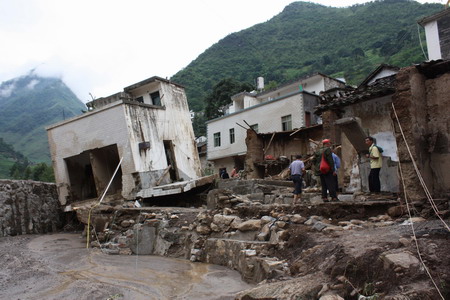Dozens confirmed dead in landslides
 |
|
A building lies smashed by a rain-triggered landslide on early Tuesday in Xiaohe Township, Zhaotong City in Yunnan province. Landslides left 24 people dead and 35 missing in Southwest China’s Yunnan and Sichuan provinces on Tuesday, local authorities said. [China Daily] |
Landslides slammed into three mountain hamlets in western China early on Tuesday, killing at least 25 people and leaving 34 missing, while crews drained a fast-rising reservoir in another part of the country following heavy rains.
The landslides swept through three different areas in Yunnan and Sichuan provinces. In the worst hit town, Xiaohe of Zhaotong city in Yunnan, 11 were confirmed dead and rescuers were searching for 33 others missing, according to Zhaotong government.
The missing included nine pupils and two teachers, Wang Zhaode, director of the general office of Party committee of Qiaojia, told China Daily.
A total of 43 people were injured including 11 badly hurt in the landslide, the local government said. All the injured have been hospitalized.
The disaster happened when a mountainside came crashing down on Xiaohe town, a river valley surrounded by mountains, following weeks of heavy downpours. Power supplies and the communications were severely damaged.
Zhaotong and Yunnan fire stations have sent 145 staff to participate in the rescue work. The relief supplies include 200 tents, 1,000 quilts and 1,000 sets of clothing.
In neighboring Sichuan province, a landslide left eight people dead in Yandai village, in the Tibetan autonomous prefecture of Garze, at 1:45 am on Tuesday. While in Luzhou city, rescuers said they had recovered six bodies and were searching for one more after a landslide hit Sima village at 4 am on Tuesday.
Meanwhile, waters in a reservoir near the northwestern city of Golmud began to subside on Tuesday after hundreds of workers and soldiers finished digging a diversion channel, an official with the Qinghai province water bureau said.
However, parts of Golmud, a transport and mining hub on the edge of the Tibetan plateau, are already under two-meters of water.
Flooding and landslides are affecting millions of people in regions along the Yangtze River.
The downpours, which continued on Tuesday, have caused the water levels in major lakes and some Yangtze tributaries to rise alarmingly even as the region is still trying to recover from the widespread deadly flooding caused by torrential rains last month.
By 9 am on Tuesday, floods in the country had killed 567 people, 251 were missing and more than 96 million people were affected, with the direct economic losses reaching 115.8 billion yuan ($17 billion) so far this year, latest data from the State Flood Control and Drought Relief Headquarters said.
The National Meteorological Center expanded it orange alert for rainstorms on Tuesday, predicting torrents will continue to batter the flooded areas in central and eastern China near the Yangtze River over the next three days.
Typhoon Conson coming
The first typhoon of the year, Typhoon Conson, is expected to make landfall in South China's Guangdong province on Thursday or Friday, according to meteorological forecasts.
Typhoon Conson began heading toward the South China Sea early on Tuesday morning.
The typhoon has wind speeds of 119 kilometers per hour.
Liang Jian, chief weatherman at the Guangdong meteorological station, said the typhoon would continue to gather strength as it approaches Guangdong at a speed of 20 km per hour.
It is expected to bring more heavy rainfall to southern parts of China.
Authorities on Tuesday also warned ships about the typhoon and ordered relevant government departments to prepare for the typhoon.
 0
0 






